Table of Contents
St. John’s wort (hypericum perforatum) is a potent antidepressant. This sprawling, leafy herb grows throughout much of the world’s temperate regions.
St. John’s wort has been used to treat a variety of internal and external illnesses dating back to the ancient Greeks. St. John’s wort supplements are derived from the flowering tops of this perennial shrub.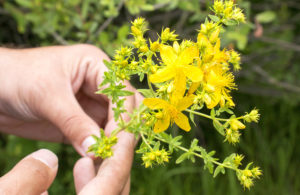
The name St. John’s wort comes from its traditional flowering and harvesting on St. John’s Day which falls on June 24.
St. John’s wort has remained a popular treatment for anxiety, depression, cuts, and burns. Recent research shows its effectiveness in treating cancer, inflammation, bacterial and viral diseases.
As a nootropic, and for cognitive health, St. John’s wort is as effective at relieving mild-to-moderate depression as the most commonly prescribed SSRI and TCA (tricyclic) antidepressants.
St. John’s wort helps:
- Neurotransmitters. St. John’s wort inhibits the uptake of serotonin, dopamine, GABA, glutamate and norepinephrine. Inhibiting the neuronal uptake of these neurotransmitters can have a profound effect on depression and mood.
- Neuroprotection. St. John’s wort extract decreases oxidative stress, prevents neurotoxicity, and brain inflammation. It helps maintain mitochondria electric potential in brain cells. And protects against cell death caused by amyloid P peptides that form plaques in the brains of those suffering from Alzheimer’s.
- Anxiety and stress. St. John’s wort extract helps alleviate the symptoms of anxiety and stress by influencing neurotransmitters. And St. John’s wort moderates the genes controlling the function of your HPA-axis which is directly related to symptoms of anxiety and stress.
Overview
St. John’s wort (hypericum perforatum) is regarded as a wildflower, herb and weed. As a nootropic, St. John’s wort is considered a powerful antidepressant.
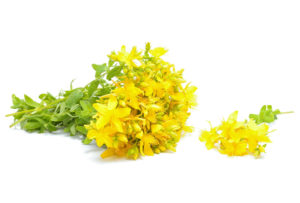
St. John’s wort is native to Europe. But can be found growing wild throughout Asia, Africa, North and South America and Australia.
Greek physicians Galen and Dioscorides prescribed St. John’s wort as a diuretic, for healing wounds and treating menstrual disorders. In the Middle Ages, it was used as a talisman for warding off evil spirits.
St. John’s wort is best harvested on St. John’s Day (June 24) when the herb is in peak bloom. Legend has it that if you placed a sprig of the herb under your pillow on St. John’s Eve, St. John himself may appear in a dream, and bless you for another year. (Not sure if this applies when you put a bottle of St. John’s wort extract under your pillow, but worth a try).
St. John’s wort first crossed the radar of modern herbalists and naturopaths in 1997. A study published in the British Medical Journal entitled, “St John’s wort for depression–an overview and meta-analysis of randomized clinical trials” pushed it to superstar herbal antidepressant status.
This meta-analysis of 23 previously published studies on St. John’s wort was drawn from foreign medical journals. The analysis showed that overall, St. John’s wort was significantly superior to placebo. And was as effective as pharmaceutical antidepressants.[i]
The British Medical Journal published another study in 2005 showing that St. John’s wort was equally effective in treating depression and better tolerated than the widely prescribed antidepressant paroxetine (Paxil).[ii]
The two major active constituents of St. John’s wort are hypericin (a naphthodianthrone) and hyperforin (a phloroglucinol). The plant contains a total of seven groups of medicinally active compounds.[iii]
Researchers have extensively documented St. John’s wort as having antidepressant, antiviral, antioxidant, anti-cancer, and antibacterial effects.[iv]
The most recent clinical studies show that hyperforin is the constituent in St. John’s wort that has the most antidepressant action.
If you’ve had limited success using St. John’s wort for depression and anxiety, your choice of supplement may be the problem. Go to “Dosage Notes” in this article to learn what extracts work best.
How does St. John’s wort Work in the Brain?
St. John’s wort boosts brain health and function in several ways. But two in particular stand out.
- St. John’s wort reduces depression. Hyperforin is the major antidepressive constituent of St. John’s wort. Hyperforin inhibits the uptake of serotonin, dopamine and norepinephrine in the brain.[v] By making more of each of these neurotransmitters available in the brain, mood is elevated and depressive symptoms decline.
Clinical trials also demonstrate that the level of antidepressant effect of St. John’s wort extract is entirely dependent on the concentration of hyperforin.[vi]
A study in Berlin compared the efficacy of using St. John’s wort extract (WS 5570) to paroxetine (Paxil) in treating moderate to severe depression.
In this multicenter, randomized, double-blind study, 130 patients who received 900 mg or 1800 mg per day of St. John’s wort, or 40 mg of paroxetine were included.
The study showed that St. John’s wort and paroxetine were equally effective in preventing relapse in continuation of treatment after recovery from moderate to severe depression. And that St. John’s wort was an important alternative treatment option for long-term prevention of depression.[vii]
- St. John’s wort reduces stress. St. John’s wort is licensed in Germany to treat anxiety, depression and sleep disorders. But scientists and researchers are still working on what in this plant provides the anxiolytic effects.
The anti-anxiety effects of St. John’s wort have been attributed to the binding affinity of at least 10 different extracts of the herb. Including naphthodianthrones like hypericin, flavonoids, xanthones, and bioflavonoids for adenosine triphosphate (ATP). GABAA, GABAB and glutamine receptors, as well as the inhibition of monoamine Oxidase-A and -B activity. And synaptic uptake of serotonin, dopamine and norepinephrine.[viii]
All we know for sure at this point is that St. John’s wort works to help alleviate some forms of anxiety. One German study ran a multicenter, randomized, placebo controlled, 6-week trial comparing the efficacy of St. John’s wort extract LI 160 (600 mg/day), and placebo in 151 out-patients suffering from anxiety.
The data from the trial shows that St. John’s wort extract (LI 160) has superior effectiveness in controlling anxiety symptoms. And tolerability of the extract was excellent.[ix]
How things go bad
Depression can be experienced at any age. Imbalances in neurotransmitters including serotonin, dopamine, and norepinephrine can affect everything from cognition to mood.
↓ Memory, recall, reaction time and mood diminish
↓ Neuroreceptors decline
↓ Neurotransmitters levels decline
↑ Anxiety, panic attacks, stress and insomnia rise
↓ Neuroplasticity declines degrading long-term potentiation
Under conditions of depression and chronic stress your brain loses the capacity to transmit signals between neurons efficiently. Memory, cognition, and decision-making all suffer as a result.
St. John’s wort benefits
St. John’s wort inhibits synaptic uptake in your brain of serotonin, dopamine, and norepinephrine with approximately equal affinity.
Research shows that St. John’s wort also has an affinity for adenosine (ATP), GABA and glutamate receptors. And in the lab, scientists discovered it downregulates beta-adrenergic receptors and upregulates serotonin receptors.[x]
Adrenergic receptors are a class of G protein receptors that are targets of the catecholamines like norepinephrine and epinephrine (adrenaline). This upregulation and downregulation of neurotransmitter concentrations are in areas of the brain implicated in depression.
And finally, neuroendocrine studies show that St. John’s wort is involved in the regulation of genes that control HPA-axis function. Also contributing to the antidepressant action of this herb.[xi]
Much of the therapeutic activity is attributable to St. John’s wort active phytochemical ingredients hypericin, hyperforin and several flavonoids.[xii]
This novel mechanism of action is unlike any other single pharmaceutical antidepressant or nootropic. And underlies St. John’s wort’s profound effect on depression.
St. John’s wort also has strong antibacterial[xiii] and antiviral[xiv] properties. St. John’s wort inhibits tumor cell growth.[xv]
Research shows that St. John’s wort extracts decrease oxidative stress and prevent neurotoxicity, and inflammation. And may be an effective treatment for oxidative stress-related neurodegenerative disorders like Parkinson’s and Alzheimer’s.[xvi]
St. John’s wort shows promise as an anti-inflammatory.[xvii] Thousands of years of clinical use shows St. John’s wort works as a wound-healing agent.
And St. John’s wort even helps reduce the effects of opium dependence by reducing withdrawal symptoms.[xviii] Handy if you’re coming off of opiates.
How does St. John’s wort feel?
If you have had problems with using SSRI prescription antidepressants, St. John’s wort extract may be a good option for you.
St. John’s wort does not produce the same side effects as pharmaceutical antidepressants. Sex drive is not affected. No withdrawal symptoms when you stop taking St. John’s wort.
Users of St. John’s wort extract say it often works sooner than expected, and gets better over time.
St. John’s wort extract helps provide better focus, and fewer Obsessive-Compulsive Disorder (OCD) symptoms. Users report an end to procrastination, less irritation, and better mood.
St. John’s wort extract takes the edge off situations that would normally stress you. Feelings of anxiety are less or non-existent.
Women going through menopause report feeling more emotionally stable when using St. John’s wort extract. Mood swings are no longer an issue.
If you deal with PTSD you may find that St. John’s wort extract will put a stop to the rage. And long-term depression could be a distant memory.
If you are sure your depression is caused by a serotonin imbalance, you should feel the mood-lifting effects of St. John’s wort.
But neuroscience is a complicated subject. And everyone’s body and wiring are different. St. John’s wort does not work for all types of depression or anxiety.
If your depression is caused by a hormone imbalance, a depleted microbiome, an issue with dopamine levels or other neuroreceptor issue, you may not experience the benefit of St. John’s wort.
And please, please do not combine St. John’s wort with prescription antidepressants! Serotonin Syndrome is real and could kill you. Literally.
The Research
The Politics of Treatment for Depression
Most clinical studies using St. John’s wort for depression have been conducted in Europe. And were targeted in cases of mild to moderate depression.
And then came a study done at Vanderbilt University in the US in 2001 which made headline news and created a ton of controversy. This study discredited the herb’s use in treating patients with major depression.
I’m including this study to draw your attention to why we cannot always rely on “clinical studies” to study a nootropic’s efficacy in brain optimization. And why the nootropics community often resorts to personal experience, and the reviews of other neurohackers.
This double-blind, placebo-controlled trial worked with 200 adult outpatients (mean age 42.4 years) who were diagnosed with major depression. Patients were randomly assigned to receive 900 mg per day of St. John’s wort extract or a placebo for 4 weeks. And if they did not respond, the dose was raised to 1,200 mg per day (or a placebo) for another 8 weeks.
The researchers concluded that there was no significant change in patient depression scores. And that St. John’s wort was no better than placebo for treating major depression.
Their conclusion was, “St. John’s wort was not effective for treatment of major depression”.[xix]
I bring this study up for one reason: the study was funded by Pfizer, the pharmaceutical manufacture of Zoloft. The leading synthetic antidepressant medication.
In 2015, the FDA in the US pushed Pfizer Inc. to modify the safety warning for Zoloft®. Linking Zoloft to causing heart defects in newborns. This in response to hundreds of lawsuits by women who say they weren’t adequately warned that Zoloft could cause defects in their newborns.
Zoloft sales for Pfizer made the company $3.3 billion in 2005.[xx]
It seems to me that having a major pharmaceutical company funding the study of an herb that is in direct competition to one of their main profit-centers is a direct conflict of interest. And there was no way Pfizer was going to have a clinical trial show that St. John’s wort was as good as, or better than Zoloft.
It’s also interesting that sales of St. John’s wort annual USA sales reached a peak of $315 million in 1998. But had declined to about $60 million by 2006.[xxi] Bad press strongly affected the sales of this natural antidepressant. And yet the sales of pharmaceutical antidepressants continue to rise.
St. John’s wort as a Treatment for Mild-to-Moderate Depression
A study at St. John’s Episcopal Hospital in New York compared St. John’s wort to the SSRI sertraline (Zoloft®) in the treatment of depression.
In this double-blind, randomized study, 30 outpatients (mean age 45.5 years) with mild to moderate depression received 600 mg per day of standardized St. John’s wort extract or 50 mg per day of sertraline for 1 week.
This was followed by 900 mg per day of St. John’s wort extract or 75 mg per day of sertraline for another 6 weeks.
The severity of depression symptoms was significantly reduced in both treatment groups. Clinical response was noted in 47% of patients receiving St. John’s wort. And 40% in patients receiving sertraline.
The researchers concluded that St. John’s wort extract was at least as effective as sertraline in the treatment of mild to moderate depression.[xxii]
St. John’s wort for Major Depression
I include this study done in 2008 for using St. John’s wort as treatment for major depression as a response to the questionable study sponsored by Pfizer in 2001.
This study done in Munich, Germany investigated whether extracts of St. John’s wort are more effective than placebo in treating major depression. And as effective with fewer side effects than standard antidepressant drugs.
This study was a review of 29 trials including a total of 5,489 patients. It included 18 comparisons with placebo and 17 comparisons with synthetic “standard antidepressants”. The standard antidepressants included tricyclic and SSRI antidepressants.
The author’s conclusions reported that the available evidence suggests that St. John’s wort extracts were superior to placebo in patients with major depression. St. John’s wort extracts were similarly effective as standard antidepressants. And St. John’s wort extracts had fewer side effects than standard antidepressants.[xxiii]
St. John’s wort helps OCD
A study done at the Dean Foundation for Health Research and Education analyzed 12 patients who had been diagnosed with OCD. Patients received 450 mg of St. John’s wort twice daily for 12 weeks.
The study included weekly evaluations using three different Obsessive-Compulsive scales. And a monthly evaluation with the Hamilton Rating Scale for Depression.
Changes in obsessive compulsive behavior occurred within one week of supplementing with St. John’s wort. And changes continued to improve over the course of the 12-week trial.
5 of the 12 patients were rated “much” or “very much” improved, 6 patients were rated “minimally” improved, and 1 person had no change in symptoms.
The researchers concluded that St. John’s wort could be an effective treatment for Obsessive-Compulsive Disorder (OCD).[xxiv]
St. John’s wort recommended dosage
St. John’s wort is available from local health food and vitamin stores and online. St. John’s wort comes in capsule, tablet and powder form. It’s also available as tinctures, teas and oil-based lotions.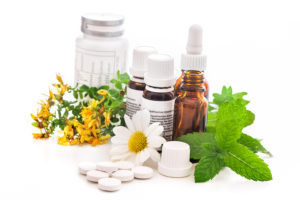
Most St. John’s wort supplements are standardized to contain 3% hypericin. But the most recent clinical studies show that hyperforin is the constituent in St. John’s wort that has the most antidepressant action.
Researchers say that the benefits of St. John’s wort are only applicable to standardized extracts such as LI 160, WS 5570/2, and ZE 117.[xxv]
Check the labels and look for:
- Perika® which is WS 5570 extract
- Kira® which is LI 160 extract
- New Chapter SC27 who produce their own extract
There are reports and some clinical data which suggest that the photosensitivity caused by hypericin can cause cataracts and blindness. All the more reason to play it safe, and go with a high quality St. John’s wort extract containing hyperforin.[xxvi]
Recommended doses for St. John’s wort extract:
- St. John’s wort for anxiety: 900 mg twice daily
- St. John’s wort for mild to moderate depression: 300 mg 3-times daily
- St. John’s wort for severe depression: 900 – 1800 mg daily
- St. John’s wort for OCD: 450 – 1800 mg daily for 12 weeks
- St. John’s wort for PMS: 300 – 900 mg daily for 2 menstrual cycles
- St. John’s wort for irritable bowel syndrome: 450 mg twice daily for 12 weeks
- St. John’s wort for nerve pain: three 900 mcg hypericin tablets for 2 treatment periods of 5 weeks each
St. John’s wort side effects
Side effects with St. John’s wort are generally mild and can include stomach upset, hives, skin rashes, fatigue, restlessness, headache, dry mouth, dizziness and confusion.
Research shows the Hyperforin found in St. John’s wort is a potent noncompetitive inhibitor of CYP2D6 activity and competitive inhibitor of CYP2C9 and CYP3A4 activity. And Hypericin also demonstrated potent inhibition of several CYP activities.
A researcher working in Pfizer’s Central Research Division said this, “These in vitro data indicate that St. John’s wort preparations contain constituents that can potently inhibit the activities of major human drug-metabolizing enzymes and suggest that these preparations should be examined for potential pharmacokinetic drug interactions in vivo.”
As a neurohacker this means that St. John’s wort can either potentiate the effectiveness of some of the nootropics in your stack, or prescription drugs you are using. Or can prevent you from experiencing the benefits of a nootropic supplement or med.
St. John’s wort can interfere with getting pregnant, or make infertility worse. It can make ADHD symptoms worse. Particularly if you’re taking Ritalin.
St. John’s wort may increase the risk of psychosis in those with schizophrenia, and may contribute to dementia in those with Alzheimer’s.
St. John’s wort can interact with medications used during surgery. So if you’re anticipating surgery avoid St. John’s wort.
Do not take St. John’s wort if you have bipolar disorder.
Some St. John’s wort extracts can make your skin and eyes overly sensitive to sunlight. You should avoid sunlamps, tanning booths and tanning beds while using a St. John’s wort product containing hypericin.
There is some clinical data showing that St. John’s wort products that contain hypericin may cause blindness.[xxvii]
St. John’s wort and Serotonin Syndrome
Cytochrome P450 3A4 (CYP3A4) is a liver enzyme whose job is to oxidize small, foreign organic molecules and toxins so they can be removed from your body.
Some substances, including St. John’s wort and grapefruit juice, affect the enzyme CYP3A4. And can amplify or weaken the action of those drugs and nootropics.[xxviii]
St. John’s wort interacts with tricyclic, SSRI and MAOI antidepressants. Taking St. John’s wort with these medications increases their action, and could lead to serotonin syndrome which can be deadly.
Do not take St. John’s wort with antidepressants including:
- Tricyclic: Amitriptyline (Elavil), nortriptyline (Pamelor), imipramine (Tofranil)
- SSRI: Citalopram (Celexa), escitalopram (Lexapro), fluvoxamine (Luvox), paroxetine (Paxil), fluoxetine (Prozac), sertraline (Zoloft)
- MAOI’s: (Phenelzine (Nardil), tranylcypromine (Parnate)
St. John’s wort can reduce levels of antihistamines in your body. It can increase the risk of bleeding when combined with Plavix and birth control pills. Do not use St. John’s wort with Warfarin as it can reduce its effectiveness.
Drugs that suppress the immune system can lose their effectiveness with St. John’s wort. It should not be used with drugs that treat HIV and AIDS.
St. John’s wort can increase the sedative effect of barbiturates, benzodiazepines (Valium), and triptans that treat migraines.
St. John’s wort also interacts with antifungal drugs, statins, calcium channel blockers, and any other medication that is broken down by the liver. Which covers a lot of drugs and nootropics.
Serotonin Syndrome is not to be messed with. An overload of serotonin in your brain can make you very sick. And can ultimately kill you. We’re not kidding here.
If you suspect anything could cause problems if it’s increased or decreased in your system, do not use St. John’s wort. If your goal is to treat depression and mood issues, you have many other safer options available to you.
Type of St. John’s wort to buy
St. John’ wort is available in tablet, capsule and powder form. Most are standardized to contain 0.3% hypericin. But the most recent clinical studies show that hyperforin is the constituent in St. John’s wort that has the most antidepressant action.
Researchers say that the benefits of St. John’s wort are only applicable to standardized extracts such as LI 160, WS 5570/2, and ZE 117.[xxix]
Check the labels and look for a product containing:
- Perika® which is WS 5570 extract
- Kira® which is LI 160 extract
- New Chapter SC27 who produce their own extract
St. John’s wort is also available in tinctures, teas and oil-based skin lotions.
Nootropics Expert Recommendation
St. John’s wort extract up to 900 – 1,800 mg per day
 I recommend using St. John’s wort extract as a nootropic supplement. But with the strongest warning we’ve issued for any nootropic mentioned on Nootropics Expert®.
I recommend using St. John’s wort extract as a nootropic supplement. But with the strongest warning we’ve issued for any nootropic mentioned on Nootropics Expert®.
Do not combine St. John’s wort with prescription antidepressants because the combination puts you in serious danger of Serotonin Syndrome.
St. John’s wort may also nullify or amplify the effects of other drugs including nootropics in your stack. This is caused by the suppression or induction of certain enzymes in your liver.
Check the “Side Effects” portion of this article. And do your research before using St. John’s wort if you are taking any other medication or nootropic. Including the section on how St. John’s wort can either increase the effectiveness of some nootropics and prescription meds. Or prevent you from experiencing their benefits depending on the supplement or drug. Because of its effects on liver enzymes.
Your body does not make St. John’s wort on its own. So to experience its antidepressant effects, you must take it as a supplement.
St. John’s wort is especially helpful for those suffering from depression, anxiety and stress. Studies show it may help stop and reverse the devastating effects of stress on your brain, and body.
St. John’s wort stacks well with SAM-e.
You can safely take up to 1,800 mg of St. John’s wort daily if needed. Half the dose first thing in the morning. And the other half early afternoon. St. John’s wort can cause insomnia. So avoid taking it too late in the day.

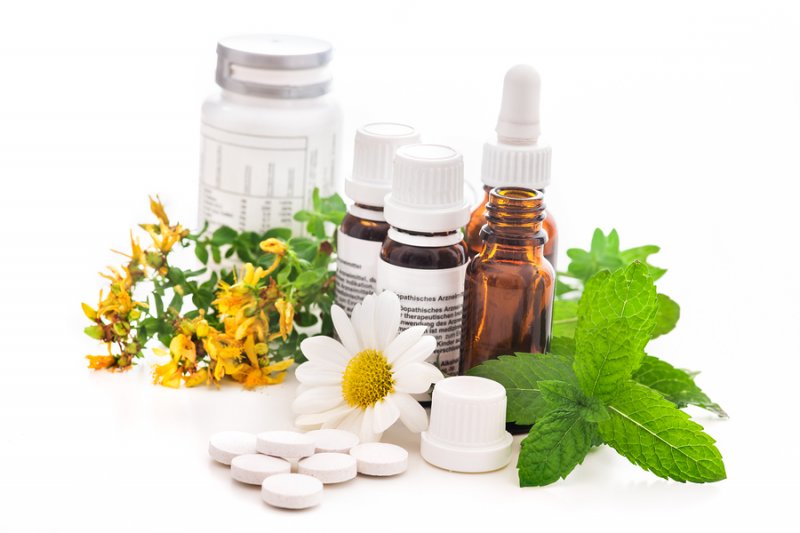


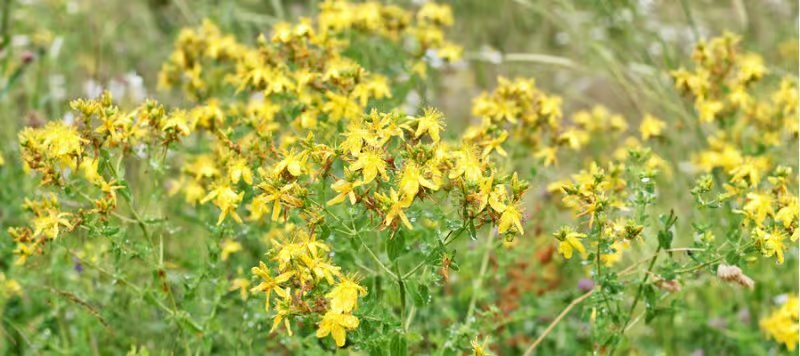





Join The Discussion - 279 comments
Eve
February 23, 2022
I am starting to take Perika…only about 5 days now. My question is that with regular SJW (with the hypericin extract), I was not able to
take Omeprazole because it reacts negatively with SJW (It gave me a bad stomach ache). It seemed you may have addressed taking Perika with other drugs in your article but I did not understand what the conclusion was. Is Perika more tolerable with other drugs or less so?
My other question is that I currently take 200mg-300mg of 5HTP in the evening for sleep. I was wondering if that would be ok with taking 900mg. Perika daily. I may increase the Perika to 1200mg. but am hoping I won’t have to. Years ago I was on 20mg. Paxil. I heard that 900mg. Perika is equivalent to 40mg. Paxil. So I’m thinking 900mg. daily should be more than enough.
I also take ginkgo biloba twice a day and hope this would not interfere with Perika.
Thank you for this article! I printed it out because I want to keep referring back to it. Thank you for your help.
David Tomen
February 24, 2022
Eve, those two are contraindicated in either form of St. John’s wort: https://www.drugs.com/drug-interactions/omeprazole-with-st-john-s-wort-1750-0-2106-0.html. According to the data SJW makes Omeprazole lose its effectiveness.
And I highly recommend being careful combining St. John’s wort with 5-HTP because there is a good chance you’ll end up with Serotonin Syndrome. Which can be deadly.
So, choose between 5-HTP or SJW and not both. And use SJW if you do not care whether Omeprazole works or not.
Dean
February 7, 2022
Hi David,
i have read about the beta adrenergic downregulation.
I get beta blocker for my anxiety related stress response, does SJW reduce the stress response with prolonged use aswell ?
Because its often not easy to time beta blocker correctly, while permanent down regulation might be more helpful (i dont know).
Which active ingredient is most likely responsible for downregulation of beta adrenergic receptors ?
Can i take SJW together with Propranolol ?
David Tomen
February 9, 2022
Dean, while it is not officially recorded chances are high that St. John’s wort is contraindicated with Propranolol. SJW has two major active components: hypericin and hyperforin. As for which one downregulates beta adrenergic receptors I invite you to read through this article to find out: https://www.ncbi.nlm.nih.gov/books/NBK92750/
Craig
January 22, 2022
Excellent article Mr Tomen. I am taking perika – 600mg morning, 300mg lunch and 300mg dinner. Been on it for 2 weeks and have no adverse affects. Definitely improving, but thinking due to my anxiety of increasing to 1800mg per day to Hopefully get even more relief. A couple of questions
1) should I wait for a month (as indicated on bottle) to see how I feel, or just increase now
2) is the only potential negative issue with increasing my dosage the risk of seratonin syndrome (I am not at risk)
3) does SJW lose it’s effectiveness over time
4) once I feel more balanced (even months of usage) should I reduce to a maintenance dosage?
5) lastly does one need to taper off SJW as with SSRIs?
Thank you very much for your time and help.
David Tomen
January 22, 2022
Craig, some take 3 – 4 weeks when using herbs before they experience its full benefit which is likely what the manufacturer is referring to. But some also respond within the same day. It depends on your system. There is no way to tell beforehand how you will respond. You can try to increase the dose and see if it works for you.
But keep in mind the maximum recommended dose. Because I have learned the hard way that “more is never better“.
St. John’s wort will not cause Serotonin Syndrome unless you combine it with a prescription SSRI, MAOI, or tricyclic drugs.
It should not “lose its effectiveness over time”. People have been using this supplement for hundreds of years.
Some people experience withdrawal symptoms for 1 – 3 weeks when abruptly quitting St. John’s wort. But not everyone. Again, it depends on your system and there is no way to predict how you will respond. But it is nothing like coming off of prescription SSRI’s or benzos. Not even close.
Craig
January 23, 2022
Thanks David. Can you just clarify your point ‘more is not better’ you mean more than the maximum recommended dose (1800mg) or are you saying more than what I’m taking (1200mg) is not necessarily better.
David Tomen
January 23, 2022
Craig, I am saying that more than the maximum recommended dose of 1,800 mg St. John’s wort extract is not better. That is the maximum you should use. If that does not take care of your symptoms then it’s time to re-visit this and figure out what else may be causing your anxiety.
Craig
January 23, 2022
Thanks David. 100% with you!Last question – would you recommend taking 900mg twice a day for anxiety or 600mg three times a day?
David Tomen
January 24, 2022
Craig, I honestly do not think it would make any difference if St. John’s wort was split in to 2 or 3 doses.
Jay
December 26, 2021
Hi David
Can you please send me a link to a recommended st John’s wort. The previous links have no stock – that product also states one 300mg tablet X 3 times a day =1800mg, which is double this dose, is this right (for concerns mentioned in your article)?
Also, any contradictions between st John’s wort and; NAC, Maca, lion’s mane, ashwaghanda ltheanine, lemon balm or melatonin (small dose)
David Tomen
December 26, 2021
Jay, Perika is the only St. John’s wort supplement I recommend here in the USA: https://amzn.to/3ptaVW1. And 300 mg X 3 is 900 mg. But up to 1,800 mg per day is recommended for severe depression.
It may be contraindicated with MACA, Ashwagandha, and Lemon Balm although there are no studies of course verifying this. Just keep in mind that St. John’s wort if a very potent herbal nootropic and needs to be treated like a prescription drug with a similar mechanism of action.
Jay
December 26, 2021
Thanks David. If it is contradicted with those adaptogens (maca/lion’s mane and ashwaghanda) should I stop taking those?
I’m NOT on any medications at all, so I’m ok if that means it may just affect their effectiveness.
Last question, should one ramp up if wanting to take 1800mg a day?
David Tomen
December 27, 2021
Jay, I am not saying to quit those adaptogens if using St. John’s wort. But I am saying be cautious because it depends on how your system reacts. Some could experience Serotonin Syndrome and others may not. Serotonin Syndrome is serous stuff and can result in death with the wrong combo.
Unlike prescription meds that are contraindicated, there is no data testing the safety of these supplements when used with St. John’s wort. It is up to the user to figure this out.
And be cautious as well about “ramping up” because more is almost always NOT better.
Jayay
December 27, 2021
Thanks David. If it’s just the seretonin risk, then the adaptogens are fine. You state in your article that st John’s wort stacks well with SAMe. I would have thought
thiswould pose a higher risk of seretonin syndrome?
David Tomen
December 28, 2021
Jay, SAM-e affects levels of serotonin, but not the same way as SSRI or tricyclics work. They prolong the effect of serotonin by blocking its reuptake after it carries its signal from neuron to another.
SAM-e on the other hand is involved in the methyl group that contributes to serotonin synthesis. That is not going to cause Serotonin Syndrome.
Kinddoctor
December 25, 2021
Iquitted venlafaxine one month ago
Iwas diagnosed with adhd and GAD
Now
Iam on st john wort 300 mg 3 times
Ashwaganda 450 three times
L tyrosine 500 two times
Niacin 500 three times
Omega 3
Spirulina
Cold showers
Breathing wim hof
My question could i use methylene blue??
David Tomen
December 26, 2021
Should not be a problem.
Don Whitman
December 22, 2021
David, Thanks for all the valuable information. I have been taking SJW for quite some time and am thinking of trying Saffron instead. What is the best way to make this change?
Thanks
David Tomen
December 23, 2021
Don, I suggest slowly weaning yourself off St. John’s wort. I’d hate for you to go through detox by quitting it suddenly to make the switch.
Henry
November 18, 2021
Greetings David,
Given the nature of CYP3A4 I wonder if it would negate the benefits of supplements that are natural and/or endogenous, so to speak, to the human body. Daily I take:
B Complex
DHA
Magnesium
CDP Choline
May you provide insight?
Thank you
David Tomen
November 18, 2021
Henry, each of these supplements are metabolized by either your liver or your kidneys. The best way to find this information for each supplement is to do a Google search for something like “what liver enzyme does DHA use” and variations on that theme.
Henry
November 18, 2021
Aha I gotcha! Thank you again.
Henry
November 18, 2021
I’m going to research right away as I am very considering using St John’s Wort.
Kathy Newburn
November 16, 2021
Thank you for all your helpful information. I’m considering taking St. John’s Wort but wondered about your comment re-blindness. I have glaucoma and wonder if it would be adversely affected by taking St. Jon’s Wort? Thanks for your help.
David Tomen
November 18, 2021
Kathy, there is some clinical data showing that St. John’s wort products that contain hypericin may cause blindness. But you can avoid this by using a St. John’s wort supplement standardized to include only hyperforin.
Look for a supplement containing the patented Perika® like this one: https://amzn.to/3x4G7x4
Kathy
November 20, 2021
Thanks so much David. This was the only one I could find with Hyperforin but the reviews on Amazon were pretty bad, saying it used to be good but now it’s changed causing lots of side-effects, including temporary blindness and headaches. I’m very “reactive” and get headaches and other side effects easily. But I’m willing to try it.
Thanks again.